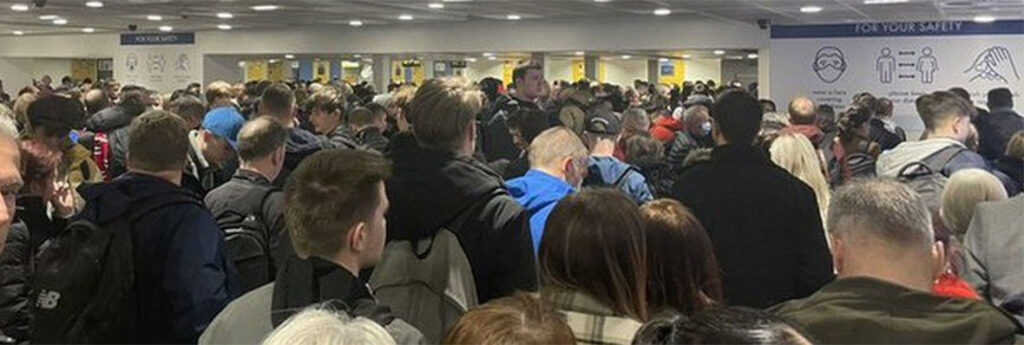A major British airport has warned passengers to expect the delays plaguing travel to continue for months, as the UK aviation regulator told the country’s air industry to shape up after weeks of cancelled flights and long airport queues.
But the head of Manchester Airport in northwest England said passengers could face waits of up to 90 minutes to get through security “over the next few months.”
Travellers in Britain have suffered days of delays during the current Easter school holiday break, with British Airways and easyJet cancelling hundreds of flights because of coronavirus-related staff absences, and long lines building at airport check-in, security, and baggage points.
Manchester, Heathrow, and Birmingham airports have all experienced problems, stemming from a mix of staff off sick with COVID-19 and from trouble replacing workers laid off during the pandemic, when international travel ground to a halt.
(Ed. note: A Travel Industry Today trip through LHR on March 30 resulted in about an hour’s queue upon arrival through automatic “fast track” customs processing available to Canadians, by which point luggage was waiting, and no problems checking in upon return home.)
The managing director of Manchester Airport resigned last week. Charlie Cornish, chief executive of owner Manchester Airports Group, acknowledged that the airport does not have “the number of staff we need to provide the level of service that our passengers deserve.”
“Despite our efforts since last autumn, the tight labour market around the airport has meant we have just not been able to hire people quickly enough to establish a full-strength team,” he said.
He said departing passengers should arrive three hours before their flights to be sure of having enough time.
Civil Aviation Authority Chief Executive Richard Moriarty told airlines they must set “deliverable” schedules and “have the necessary level” of staff.
In a letter, he said the delays and cancellations were “not just distressing for affected consumers but have the potential to impact confidence levels across the industry.”
EasyJet said earlier this week that the number of crew illnesses was more than double normal levels because of high COVID-19 infection rates across Europe.
British Airways said many of its cancellations include flights that were cut when it decided last month to shorten its schedule until the end of May to boost reliability amid rising COVID-19 cases.
Infections across the UK have soared again with the rapid spread of the more transmissible omicron BA.2 variant, reaching record levels last week when official figures showed about 1 in 13 people had the virus.
The Easter school holidays are the first time many families in Britain have booked trips abroad after two years of pandemic restrictions. All remaining virus measures, including mandatory self-isolation for those infected and testing requirements for international travel, were scrapped in February and March.
Traffic also has been snarled at the English Channel port of Dover after P&O Ferries suspended sailings to France after firing almost 800 crew members without notice to replace them with cheaper contract staff. The move sparked a standoff with the British government, which is demanding P&O reverse the sackings.
Other ferry operators say their boats are full, and miles-long queues of thousands of trucks have built up over the past week outside Dover, one of the UK’s busiest ports for both passengers and freight.

